编辑点评:大学生英语6级真题试卷
2019年6月大学英语六级考试真题第1套,第2套和第3套pdf文件免费分享给大家,可用于备考6级的试题,一般刷个近三年的就可以了,所以还是比较有参考价值的,欢迎免费下载。
2019年6月六级考试真题电子版预览
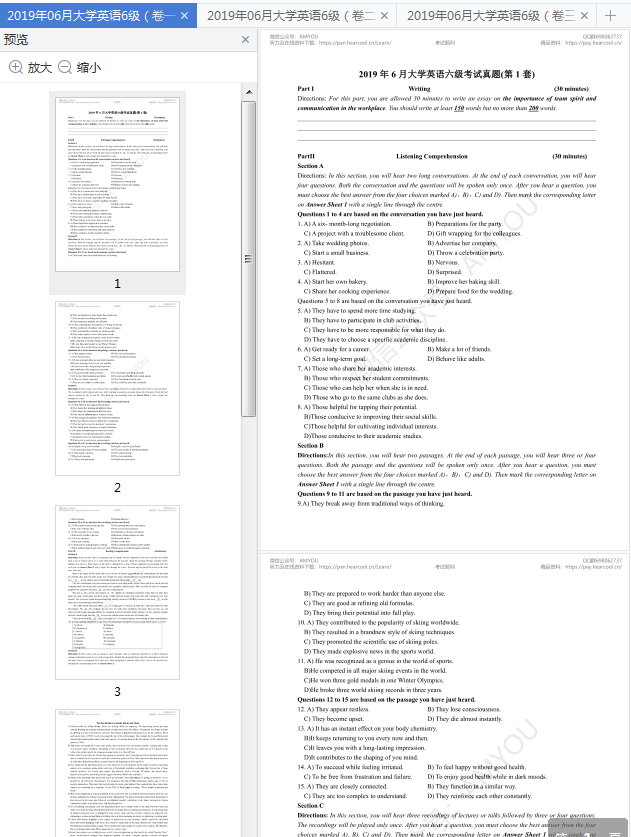
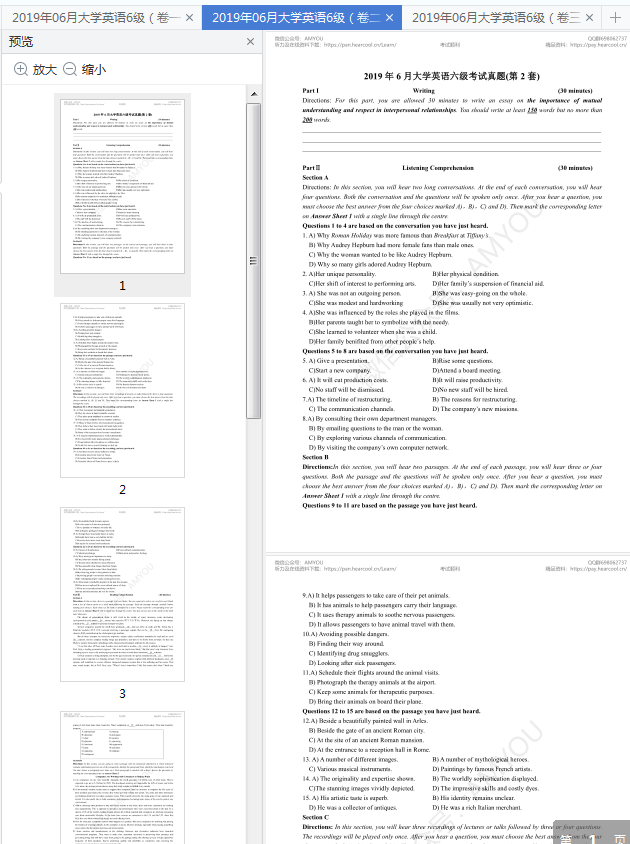
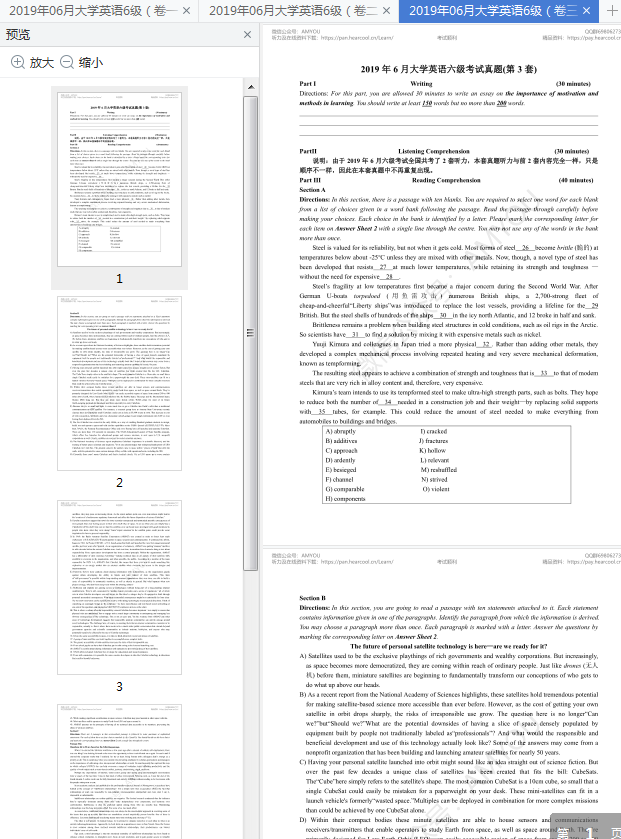


2019年6月六级考试真题及解析汇总
Part I Writing (30 minutes)
Directions: For this part, you are allowed 30 minutes to write an essay on the importance of motivation and methods in learning. You can cite examples to illustrate your views. You should write at least 150 words but no more than 200 words.
Directions: For this part, you are allowed 30 minutes to write an essay on the importance of mutual understanding and respect in interpersonal relationships. You can cite examples to illustrate your views. You should write at least 150 words but no more than 200 words.
Directions: For this part, you are allowed 30 minutes to write an essay on the importance of team spirit and communication in the workplace. You can cite examples to illustrate your views. You should write at least 150 words but no more than 200 words.
2019年6月大学六级考试刚刚结束,相信同学们对写作话题还记忆犹新。这次的六级作文共有三个话题,且都是围绕着“重要性”进行展开。整体难度较去年来看,基本持平。接下来,文都四六级老师将六级的三个作文给大家作一个简单的剖析。
【六级写作话题汇总】
Directions: For this part, you are allowed 30 minutes to write an essay on the importance of motivation and methods in learning. You can cite examples to illustrate your views. You should write at least 150 words but no more than 200 words.
Directions: For this part, you are allowed 30 minutes to write an essay on the importance of mutual understanding and respect in interpersonal relationships. You can cite examples to illustrate your views. You should write at least 150 words but no more than 200 words.
Directions: For this part, you are allowed 30 minutes to write an essay on the importance of team spirit and communication in the workplace. You can cite examples to illustrate your views. You should write at least 150 words but no more than 200 words.
【题目点评】
首先,今年的六级考试作文和四级有着很大的不同,四级考的是新闻报道,有很多同学一上来是蒙蒙的,不知道新闻报道该如何入手,而六级则属于话题作文,主要围绕大学生学习,生活,就业三个方面来展开考查的,没有出现难词偏词,难度并不大,考生驾驭起来相对容易些。
其次,从考察内容上来讲,题目日益贴近大学生的实际生活,重在考察学生的实际写作水平,一些“假大空”的所谓模板句则越来越没有用武之地,因此,考生要切实提高写作水平,对于描写、记叙、说明、议论、举例等写作手法都要掌握。例如,本次考试当中就涉及到关于“目的与方法”,“理解与尊重”,“合作与沟通”相关重要性的论证。鉴于上述原因,平时加强英文写作训练就显得尤为重要。
最后,作文的评分标准通常涉及到语言、结构和内容这三个维度。通常老师在阅卷时最在意的是语言部分,所以各位考生在备考时要多在语言用词方面下功夫。除此之外,细节决定成败,还需要注意格式和单词的拼写。
关于本次六级考试写作题目的范文和解析请大家参见文都教育官网!希望大家能以考试为动力,在英语学习上能够百尺竿头更进一步!
2019年6月大学英语六级作文真题-合作精神与沟通的重要性
2019年6月大学英语六级考试已经圆满结束了。相信刚刚走出考场的各位同学已经迫不及待得想知道自己的答题情况。为了让各位考生更好的而了解自己的写作模块额情况,文都四六级的老师就来带大家一起来看这次的六级作文真题解析。刚刚出炉的六级作文题目如下:
Directions: For this part, you are allowed 30 minutes to write an essay on the importance of team spirit and communication in the workplace. You can cite examples to illustrate your views. You should write at least 150 words but no more than 200 words.
1.写作时间是30分钟。时间紧,任务重,因此,我们要采用三段式,快速构思提纲,即:点题、论证、结论。
2.写作主题:在工作中,团队精神与沟通的重要性
3.写作字数是150-200字。
参考范文:
The Importance of Team Spirit and Communication in the Workplace
When it comes to the team spirit and communication, all of us ought to see it in perspective. Fortunately, with the society commercializing and competition becoming fierce, a substantial number of people are paying due attention to it.
It is apparent that we are supposed to be aware of the importance of team spirit and communication, especially in workplace.Hardly can anyone achieve success in his career without the assistance of his colleagues and communication with his partners. As grows increasingly fierce, we must defeat our rivals through powerful team work. Take basketball star Yao Ming for an example. He can slam the duck smartly because all his teammates contribute more or less to his outstanding performance. If we work separately, we will be confined to frail minds and limited resources.
On the basis of the analysis above, we may draw a conclusion that team spirit and communication really count in this competitive society. Therefore, we should associate ourselves harmoniously with our companions in every attempt towards our goals. In addition, it is indispensable to train our kids frequently to interact smoothly with others in a team. As the frequently-quoted proverb goes, unity is strength.
参考译文:
当谈到团队精神和沟通,我们所有人都应该正确看待它。幸运的是,随着社会的商业化和竞争的日益激烈,很多人对此给予了应有的重视。
很明显,我们应该意识到团队精神和沟通的重要性,尤其是在工作场所,更是如此。没有同事的帮助和与合作伙伴的沟通,任何人都不可能在事业上取得成功。随着竞争的日益激烈,我们必须通过强大的团队合作打败对手。以篮球明星姚明为例,他能把球打得很漂亮,因为他所有的队友或多或少都对他出色的表现做出了贡献。如果我们不与其他人合作及沟通的话,我们将被限制在脆弱的思想和有限的资源中。
基于以上分析,我们可以得出结论,在这个竞争激烈的社会中,团队精神和沟通真的很重要。因此,我们应该与我们的伙伴和谐相处,为我们的目标而努力。此外,经常训练我们的孩子在团队中与他人顺畅互动是必不可少的。常言道,团结就是力量。
以上就是文都教育为各位考生带来的2019年6月份六级考试写作--合作精神与沟通的重要性的参考译文,希望可以对刚刚走下考场的各位小朋友有所助益。同时,文都教育最后预祝各位考生,顺利通过此次六级,并能取得优异的成绩。
2019年6月大学英语六级翻译真题参考答案(成语)
今年六级翻译主题与“成语”紧密相关,虽不能在之前的真题中找到相同试题,但类似的内容课堂上以及后期押题中都反复训练过并着重讲解过,所以认真听课并按要求练习过的同学应该觉得很容易。传统文化是四六级翻译和写作常考话题,大家应该高度重视,下面文都带你回顾翻译真题,并解析参考译文。
【六级翻译真题原文】
成语是汉语中的一种独特的表达方式,大多由四个汉字组成。它们高度简练且形式固定,但通常能形象地表达深刻的含义。成语大多来源于中国古代的文学作品,通常与某些神话、传说或历史事件有关。如果不知道某个成语的出处,就很难理解其确切含义。因为,学习成语有助于人们更好地理解中国传统文化。成语在日常会话和文学创作中广泛使用。恰当使用成语可以使一个人的语言更具表现力,交流更有效。
【六级翻译真题参考译文】
Chinese idiom is a unique way of expression in Chinese, mostly composed of four Chinese characters. Although highly concise and fixed in form, they usually entail profound meanings. Most idioms stem from ancient Chinese literature and are usually related with certain myths, legends or historical events. It is difficult to understand its exact meaning with little knowledge of its origin as learning idioms helps people better understand Chinese traditional culture. Idioms are widely used in daily conversation and literary creation. Proper use of idioms can make a person's language more expressive and help to deliver a more effective communication.
【六级翻译真题解析】
2019年6月六级翻译真题一共包含六句话,而且段落布局非常符合汉语短句排列、用短不用长的行文习惯;就语序而言,基本以顺序句型为主,这点和英语较为接近,因而翻译中语序无需做过大调整;就时态而言,该段话是对中国成语的一般描述,所以在翻译的过程中,以一般现在时为主;微观角度而言,关于翻译中遇到的词汇,首先关于段落核心词,“成语”,常用的翻译为“Chinese idiom”,且在试题的括号中已给出译文,如果用复数“Chinese idioms”也是可以得分的。其次是“神话、传说或历史事件”,译为“myths, legends or historical events”。“使一个人的…,交流更有效”,原文为主谓结构,翻译时转换结构并增加了help to的部分,翻译为“…help to deliver a more effective communication”。
以上就是文都四六级对2019年6月六级翻译真题参考答案精确解析,希望可以为处于紧张状态中的考生急于知道成绩的考生提供一些借鉴,并对之后的四六级考试的备考复习有所指引,最后预祝大家六级顺利上岸!
2019年6月大学英语六级真题:3套翻译
Part Ⅳ Translation (30 minutes)
Directions: For this part, you are allowed 30 minutes to translate a passage from Chinese into English.You should write your answer on Answer Sheet 2.
成语(Chinese idioms)是汉语中的一种独特的表达方式,大多由四个汉字组成。它们高度简练且形式固定,但通常能形象地表达深刻的含义。成语大多数来源于中国古代的文学作品,通常与某些神话、传说或者历史事件有关。如果不知道某个成语的出处,就很难理解其确切含义。因为,学习成语有助于人们更好地理解中国传统文化。成语在日常会话和文学创作中广泛使用。恰当使用成语可以使一个人的语言更具表现力,交流更有效。
汉语现在是世界上用作本族语人数最多的语言。汉语与西方语言的一个重要区别在于它是以方块字(character)而不是以字母构成的。目前仍在使用的书写系统中,汉语是最古老的。在中国,来自不同地区的人可能听不懂对方的方言,但由于汉子有统一的书写形式,他们交流起来几乎没有任何困难。汉语历史上对团结中华民族发挥了重要作用。今天,随着中国经济的快速增长和全球影响力的增强,越来越多其他国家的人也开始学习汉语。
中国幅员辽阔,人口众多,很多地方人们都说自己的方言。方言在发音上差别很大,词汇和语法差别较小。有些方言,特别是北方和南方的方言,差异很大,以致于说不同方言的人常常很难听懂彼此的讲话。方言被认为是当地文化的一个组成部分,但近年来能说方言的人数不断减少。为了鼓励人们更多说本地语言,一些地方政府已经采取措施,如在学校开设方言课,在广播和电视上播放方言节目,以期保存本地的文化遗产。
2019年6月大学英语六级翻译真题解析:方言
2019年6月六级考试如期结束,今年依然是采用多题多卷的方式,涉及到三个话题——成语/汉语/方言,整体在难度上并不是很大,没有出现难词偏词。接下来,文都四六级老师就其中“方言”话题进行简单的分析。
【翻译题目】
中国幅员辽阔,人口众多,很多地方人们都说自己的方言。方言在发音上差别最大,词汇和语法差别较小。有些方言,特别是北方和南方的方言,差异很大,以至于说不同方言的人常常很难听懂彼此的讲话。方言被认为是当地文化的一个组成部分,但近年来能说方言的人数不断减少。为了鼓励人们更多说本地方言,一些地方政府已经采取措施,如在学校开设方言课,在广播和电视上播放方言节目,以期保存本地的文化遗产。
【参考范文】
China is a vast country with a large population, and in many places people speak their own dialects.Dialects differ most in pronunciation, but less in vocabulary and grammar. Some dialects, especially those from the north and south, are so different that speakers of different dialects often have trouble understanding each other. Dialects are considered an integral part of local culture, but the number of people who can speak them has been decreasing in recent years. In order to encourage people to speak more local dialects, some local governments have adopted approaches, such as opening dialect classes in schools and broadcasting dialect programs on radio and television in order to preserve local cultural heritage.
2019年6月大学英语四级真题答案(第二套)
Part I Writing (30 minutes)
Directions: For this part, you are allowed 30 minutes to write a news report to your campus newspaper on a visit to a local farm organized by your Student Union. You should write at least 120 words but no more than180 words.
【参考范文】
An Impressive Activities-Visiting
In order to help us students to enrich life and broaden horizon, the Student Union organized a meaningful activity on last weekend--visiting the local farm, by which we grasped much useful knowledge about agriculture.
The farm we visited is located in the suburb of Beijing and far away from our school, which covers an area of 1000 square feet. Along with native foods like rice and potatoes, the farmers on the farm grow many organic vegetables, including corn, cucumbers, tomatoes and so forth. Besides, the farm breeds a host of local species such as dairy cattle, geese, chicken by modern scientific technique. One of the most impressive things for us is that by means of green farming methods, the problem of environmental pollution has been effectively alleviated.
This outdoors activity has a really deep impression for us. Not only did it get us closer to the nature and relieve pressure from us, it also enhance our professional knowledge about husbandry technology.
【参考范文译文】
一次难忘的参观活动
为了帮助我们学生丰富生活,拓宽眼界,学生会在上周组织了一次有意义的活动——参观当地的农场。通过这次活动,我们学习到很多关于农业的有用知识。
我们参观的农场位于北京郊区,离学校比较远。它占地面积1000平方英尺。除了象一些常规的水稻和土豆之外,农场的农民还栽种了许多有机蔬菜,其中包括玉米,黄瓜,西红柿等等。除此之外,农场还通过科学养殖的方法饲养了很多当地的禽类,象奶牛,鹅类,鸡类。这次给我印象最为深刻的是农场通过使用绿色农业耕作技术,环境污染的问题已经得到了有效的缓解。
这次户外活动给我们留下了非常深刻的印象。我们不仅可以亲近大自然有效的缓解压力,而且也让我们对畜牧业的知识有一个提升。
PartⅡ Listening Comprehension (25 minutes)
Section A
Directions: In this section, you will hear three news reports. At the end of each news report, you will hear two or three questions. Both the news report and then questions will be spoken only once. After you hear a question, you must choose the best answer from the four choices marked A), B), C) and D).Then mark the corresponding letter on Answer Sheet 1 with a single line through the centre.
Questions 1 and 2 are based on the news report you have just heard.
1.A)Heavy floods.
B)Safety concerns.
C)Bad economy.
D)Workers’ strikes.
2.A)It is competitive with its numerous tourist destinations.
B)It provides many job opportunities for French people.
C)It is the biggest concern of the French government.
D)It plays an important role in the nation’s economy.
Questions 3 and 4 are based on the news report you have just heard.
3.A)To carry out a scientific survey.
B)To establish a new research station.
C)To rescue two sick American workers.
D)To deliver urgent medical supplies.
4.A)The darkness and cold.
B)The heavy snow and fog.
C)The biting winds.
D)The ice all around.
Questions 5 to 7 are based on the news report you have just heard.
5.A)By tying it to a door handle.
B)By shaking it back and forth.
C)With a remote control craft.
D)With a full-sized helicopter.
6.A)He has lots of fans on Facebook.
B)He has rich experience in flying.
C)He often suffers from toothaches.
D)He has learned to pull teeth from a video.
7.A)Spend more time together.
B)Tell them adventure stories.
C)Do something fun and creative.
D)Play with them in a safe place.
Section B
Directions: In this section, you will hear two long conversations. At the end of each conversation, you will hear four questions. Both the conversation and the questions will be spoken only once. After you hear a question, you must choose the best answer from the four choices marked A),B),C)and D). Then mark the corresponding letter on Answer Sheet 1 with a single line through the centre.
Questions 8 to 11 are based on the news report you have just heard.
8.A)To confirm an urgent appointment.
B)To collect a package from the woman.
C)To ask the woman to sign a document.
D)To arrange the delivery of a package.
9.A)She is doing shopping.
B)She is visiting a friend.
C)She is not at home.
D)She is not feeling well.
10.A)He will be off duty the whole day.
B)He will be working somewhere else.
C)He will have to have his car repaired.
D)He will be too busy to spare and time.
11.A)Sign her name.
B)Confirm online.
C)Pay a small fee.
D)Show up in person.
Questions 12 to 15 are based on the news report you have just heard.
12.A)Vacation in Italy.
B)Study abroad.
C)Throw a farewell party.
D)Go to a fashion show in Milan.
13.A)Quite sleepy.
B)Very excited.
C)Rather depressed.
D)Nearly exhausted.
14.A)He has to attend a party.
B)He has to meet a friend.
C)He has to make a presentation.
D)He has to finish an assignment.
15.A)Say goodbye to the woman at the airport.
B)Meet the woman at the Black Cat Cafe.
C)Drive the Woman to the airport.
D)Have lunch with the woman.
Section C
Directions: In this section, you will hear three passages. At the end of each passage, you will hear three or four questions. Both the passage and the questions will be spoken only once. After you hear a question, you must choose the best answer from the four choices marked A), B), C) and D). Then mark the corresponding letter on Answer Sheet 1 with a single line through the centre.
Questions 16 to 18 are based on the passage you have just heard.
16.A) It has kept growing over the centuries.
B) Its top is hidden in clouds of volcanic smoke.
C) Its height changes with each volcanic eruption.
D) It has a recorded history of 1500 years.
17.A) They are now a tourist destination.
B) They attract a lot of migrating birds.
C) They provide shelter for the farmers.
D) They make good fields for farming.
18.A) They nest on the volcano’s slopes.
B) They feed on certain small mammals.
C) They compete with each other for food.
D) They match large mammals in strength.
Questions 19 to 21 are based on the passage you have just heard.
19.A) He is self-employed.
B) He is a career advisor.
C) He studies talent.
D) He owns a magazine.
20.A) Doing what they like best.
B) Loving the work they do.
C) Making no excuses for failures.
D) Following their natural instinct.
21.A) It does not come to anything without hard work.
B) It may prove to be quite different from hard work.
C) It is a natural gift only some special people can possess.
D) It does not come to you until something special happens.
Questions 22 to 25 are based on the passage you have just heard.
22.A) It is a bit difficult to learn.
B) It was popular in New Zealand.
C) It is a traditional type of ballet.
D) It evolved in the mid-1970s.
23.A) She wanted her to be a ballet dancer.
B) She used to be a ballet dancer herself.
C) She hated to see her idling about.
D) She was too busy to look after her.
24.A) After she started teaching English.
B) Before she left for New Zealand.
C) When she moved to New York city.
D) Once she began to live on her own.
25.A) It has renewed her passion for life.
B) It has made her happy and energetic.
C) It has helped her make new friends.
D) It has enabled her to start a new career.
Part III Reading Comprehension (40 minutes)
Section A
Directions: In this section, there is a passage with ten blanks. You are required to select one word for each blank from a list of choices given in a word bank following the passage. Read the passage through carefully before making your choices. Each choice in the bank is identified by a letter. Please mark the corresponding letter for each item on Answer Sheet 2 with a single line through the centre. You may not use any of the words in the bank more than once.
Ships are often sunk in order to create underwater reefs (暗礁)perfect for scuba diving (水肺式潜泳)and preserving marine 26 Turkish authorities have just sunk something a little different than a ship, and it wouldn’t normally ever touch water, an Airbus A300. The hollowed-out A300 was 27 of everything potentially harmful to the environment and sunk off the Aegean coast today. Not only will the sunken plane 28 the perfect skeleton for artificial reef growth, tut authorities hope this new underwater attraction will bring tourists to the area.
The plane 29 a total length of 54 meters, where experienced scuba divers will 30 be able to venture through the cabin and around the plane’s 31 . Aydin Municipality bought the plane from a private company for just under US$100,000, but they hope to see a return on that 32 through the tourism industry. Tourism throughout Turkey is expected to fall this year as the country has been the 33 of several deadly terrorist attacks. As far as sunken planes go, this Airbus A300 is the largest 34 sunk aircraft ever.
Taking a trip underwater and 35 the inside of a sunken A300 would be quite an adventure, and that is exactly what Turkish authorities are hoping this attraction will make people think. Drawing in adventure seekers and experienced divers, this new artificial Airbus reef will be a scuba diver’s paradise (天堂).
A)create
B)depressed
C)eventually
D)experiences
E)exploring
F)exterior
G)habitats
H)innovate
I)intentionally
J)investment
K)revealing
L)stretches
M)stripped
N)territory
O)victim
【参考答案】
26-30 GMALC
31-35 FJOIE
Section B
Directions: In this section, you are going to read a passage with ten statements attached to each statement contains information given in one of the paragraphs. Identify the paragraph from which the information is derived. You may choose a paragraph more than once. Each paragraph is marked with a letter. Answer the questions by marking the corresponding letter on Answer Sheet 2.
Make Stuff, Fail, And Learn While You’re At It
A) We’ve always been a hands-on, do-it-yourself kind of nation. Ben Franklin, one of America’s founding fathers, didn’t just invent the lightning rod. His creations include glasses, innovative stoves and more.
B) Franklin, who was largely self-taught, may have been a genius, but he wasn’t really an exception when it comes to American making and creativity.
C) The personal computing revolution and philosophy of disruptive innovation of Silicon Valley grew, in part, out of the creations of the Homebrew Computer Club, Which was founded in a garage in Menlo Park, California, in the mid-1970s. Members — including guys named Jobs and Wozniak — started making and inventing things they couldn’t buy.
D) So it’s no surprise that the Maker Movement today is thriving in communities and some schools across America. Making is available to ordinary people who aren’t tied to big companies, big defense labs or research universities. The maker philosophy echoes old ideas advocated by John Dewey, Montessori, and even ancient Greek philosophers, as we pointed out recently.
E) These maker spaces are often outside of classrooms, and are serving an important educational function. The Maker Movement is rediscovering learning by doing, which is Dewey’s phrase from 100 years ago. We are rediscovering Dewey and Montessori and a lot of the practices that they pioneered that have been forgotten or at least put aside. A maker space is a place which can be in a school, but it doesn’t look like a classroom. It can be in a library. It can be out in the community. It has tools and materials. It’s a place where you get to make things based on your interest and on what you’re learning to do.
F) Ideas about learning by doing have struggled to become mainstream educationally, despite being old concepts from Dewey and Montessori, Plato and Aristotle, and in the American Contcxt, Ralph Emerson, on the value of experience and self-reliance. It’s not necessarily an efficient way to learn. We learn, in a sense, by trial and error. Learning from experience is something that takes time and patience. It’s very individualized. If your goal is to have standardized approaches to learning, where everybody learns the same thing at the same time in the same way, then learning by doing doesn’t really fit that mold anymore. It’s not the world of textbooks. It’s not the world of testing.
G)Learning by doing may not be efficient, but it is effective. Project-based learning has grown in popularity with teachers and administrators. However, project-based learning is not making. Although there is a connection, there is also a distinction. The difference lies in whether the project is in a sense defined and developed by the student or whether it’s assigned by a teacher. We’ll all get the kids to build a small boat. We are all going to learn about X, Y, and Z. That tends to be one form of project-based learning.
H)I really believe the core idea of making is to have an idea within your head — or you just borrow it from someone — and begin to develop it , repeat it and improve it. Then, realize that idea somehow. That thing that you make is valuable to you and you can share it with others. I’m interested in how these things are expressions of that person, their ideas, and their interactions with the world.
I)In some ways, a lot of forms of making in school trivialize(使变得无足轻重)making. The thing that you make has no value to you. Once you are done demonstrating whatever concept was in the textbook, you throw away the pipe cleaners, the cardboard tubes.
J)Making should be student-directed and student-led, otherwise it’s boring. It doesn’t have the motivation of the student. I’m not saying that students should not learn concepts or not learn skills. They do. But to really harness their motivation is to build upon their interest. It’s to let them be in control and to drive the car.
K)Teachers should aim to build a supportive, creative environment for students to do this work. A very social environment, where they are learning from each other. When they have a problem, it isn’t the teacher necessarily coming in to solve it. They are responsible for working through that problem. It might be they have to talk to other students in the class to help get an answer.
L) The teacher’s role is more of a coach or observer. Sometimes, to people, it sounds like this is a diminished rote for teachers. I think it’s a heightened role. You’re ereating this environment, like a maker space. You have 20 kids doing different things. You are watching them and really it’s the human behaviors you’re looking at . Are they engaged? A they developing and repeating their project? Are they stumbling (受挫)? Do they need something that they don’t have? Can you help them be aware of where they are?
M)My belief is that the goal of making is not to get every kid to be hands-on, but it enable us to be good learners. It’s not the knowledge that is valuable, It’s the practice of learning new things and understanding how things work. These are processes that you are developing so that you are able, over time, to tackle more interesting problems, more challenging problems—problems that require many people instead of one person, and many skills instead of one.
N) If teachers keep it form-free and student-led, it can still be tied to a curriculum and an educational plan. I think a maker space is more like a like a library in that there are multiple subjects and multiple things that you can learn. What seems to be missing in school is how these subjects integrate, how they fit together in any meaningful way. Rather than saying, ‘This is science, over here is history,’ I see schools taking this idea of projects and looking at: How do they support children in higher level learning?
O) I feel like this is a shift away form a subject matter-based curriculum to a more experiential curriculum or learning. It’s still in its early stages, but I think it’s shifting around not what kids learn but how they learn.
36.A maker space is where people make things according to their personal interests.
37.The teachers’ role is enhanced in a maker space as they have to monitor and facilitate during the process.
38.Coming up with an idea of one’s own or improving one from others is key to the concept of making.
39.Contrary to structured learning, learning by doing is highly individualized.
40.America is a nation known for the idea of making things by oneself.
41.Making will be boring unless students are able to take charge.
42.Making can be related to a project, but it is created and carried out by students themselves.
43.The author suggests incorporating the idea of a maker space into a school curriculum.
44.The maker concept is a modern version of some ancient philosophical ideas.
45.Making is not taken seriously in school when students are asked to make something meaningless to them based on textbooks.
【参考答案】
36-40 ELHFA
41-45 JGNDI
Section C
Directions: There are 2 passages in this section. Each passage is followed by some questions or unfinished statements. For each of them there are four choices marked A), B), C) and D). You should decide on the best choice and mark the corresponding letter on Answer Sheet 2 with a single line through the centre.
Passage One
Questions 46 to 50 are based on the following passage.
Most kids grow up learning they cannot draw on the walls. But it might be time to unlearn that training—this summer, group of culture addicts, artists and community organizers are inviting New Yorkers to write all over the walls of an old house on Governor’s Island.
The project is called Writing On It All, and it’s a participatory writing project and artistic experiment that has happened on Governor’s Island every summer since 2013.
“Most of the participants are people who are just walking by or are on the island for other reasons, or they just kind of happen to be there,” Alexandra Chasin, artistic director of Writing On It All,tells Smithsonian.com.
The 2016 season runs through June 26 and features sessions facilitated by everyone from dancers to domestic workers. Each session has a theme, and participants are given a variety of materials and prompts and asked to cover surfaces with their thoughts and art. This year, the programs range from one that turns the house into a collaborative essay to one that explores the meaning of exile.
Governor’s Island is a national historic landmark district long used for military purposes. Now known as “New York’s shared space for art and play,” the island, which lies between Manhattan and Brooklyn in Upper New York Bay, is closed to cars but open to summer tourists who flck for festivals, picnics, adventures, as well as these “legal graffiti(涂鸦)” Sessions.
The notes and art scribbled(涂画) on the walls are an experiment in self-expression. So far, participants have ranged in age from 2 to 85. Though Chasin says the focus of the work is on the activity of writing, rather than the text that ends up getting written, some of the work that comes out of the sessions has stuck with her.
“One of the sessions that moved me the most was state violence on black women and black girls,” says Chasin, explaining that in one room, people wrote down the names of those killed because of it.“People do beautiful work and leave beautiful messages.”
46.What does the project Writing On It All invite people to do?
A) Unlearn their training in drawing.
B) Participate in a state graffiti show.
C) Cover the walls of an old house with graffiti.
D) Exhibit their artistic creations in an old house.
47.What do we learn about the participants in the project?
A) They are just culture addicts.
B) They are graffiti enthusiasts.
C) They are writers and artists.
D) They are mostly passers-by.
48.What did the project participants do during the 2016 season?
A) They were free to scribble on the walls whatever came to their mind.
B) They expressed their thoughts in graffiti on the theme of each session.
C) They learned the techniques of collaborative writing.
D) They were required to cooperate with other creators.
49.What kind of place is Governor’s Island?
A) It is a historic site that attracts tourists and artists.
B) It is an area now accessible only to tourist vehicles.
C) It is a place in Upper New York Bay formerly used for exiles.
D) It is an open area for tourists to enjoy themselves year round.
50.What does Chasin say about the project?
A) It just focused on the sufferings of black females.
B) It helped expand the influence of graffiti art.
C) It has started the career of many creative artists.
D) It has created some meaningful artistic works.
Passage Two
Questions 51 to 55 are based on the following passage.
Online programs to fight depression are already commercially available. While they sound efficient and cost-saving, a recent study reports that they are not effective, primarily because depressed patients are not likely to engage with them or stick with them.
The study looked at computer-assisted cognitive(认知的) behavioral therapy(CBT) and found that it was no more effective in treating depression than the usual care patients receive from a primary care doctor.
Traditional CBT is considered an effective form of talk therapy for depression, helping people challenge negative thoughts and change the way they think in order to change their mood and behaviors. However, online CBT programs have been gaining popularity, with the attraction of providing low-cost help wherever someone has access to a computer.
A team of researchers from the University of Y ork conducted a randomized(随机的) control trial with 691 depressed patients from 83 physician practices across England. The patients were split into three groups: one group received only usual care from a physician while the other two groups received usual care from a physician plus one of two computerized CBT programs. Participants were balanced across the three groups for age, sex, educational background, severity and duration of depression, and use of antidepressants(抗抑郁药).
After four months, the patients using the computerized CBT programs had no improvement in depression levels over the patients who were only getting usual care from their doctors.
“It’s an important, cautionary note that we shouldn’t get too carried away with the idea that a computer system can replace doctors and therapists, ” says Christopher Dowrick, a professor of primary medical care at the University of Liverpool. “We do still need the human touch or the human interaction, particularly when people are depressed.”
Being depressed can mean feeling “lost in your own small, negative, dark world,” Dowrick says. Having a person, instead of a computer, reach out to you is particularly important in combating that sense of isolation. “When you’re emotionally vulnerable, you’re even more in need of a caring human being ,” he says.
51.What does the recent study say about online CBT programs?
A)Patients may not be able to carry them through for effective cure.
B)Patients cannot engage with them without the use of a computer.
C)They can save patients trouble visiting physicians.
D)They have been well received by a lot of patients.
52.What has made online CBT programs increasingly popular?
A)Their effectiveness in combating depression.
B)The low efficiency of traditional talk therapy.
C)Their easy and inexpensive access by patients.
D)The recommendation by primary care doctors.
53. What is the major finding by researchers at the University of York?
A) Online CBT programs are no more effective than regular care from physicians.
B) The process of treating depression is often more complicated than anticipated.
C) The combination of traditional CBT and computerized CBT is most effective.
D) Depression is a mental condition which is to be treated with extreme caution.
54. What is Professor Dowrick’s advice concerning online CBT programs?
A) They should not be neglected in primary care.
B) Their effectiveness should not be overestimated.
C) They should be used by strictly following instructions.
D) Their use should be encouraged by doctors and therapists.
55. What is more important to an emotionally vulnerable person?
A) A positive state of mind.
B) Appropriate medication.
C) Timely encouragement.
D) Human interaction.
Part Ⅳ Translation (30 minutes)
Directions: For this part, you are allowed 30 minutes to translate a passage from Chinese into English. You should write your answer on Answer Sheet 2.
舞狮作为中国传统民间表演已有2 000多年历史。在狮子舞中,两位表演者同披一件狮子服,一个舞动头部,另一个舞动身体和尾巴。他们熟练配合,模仿狮子的各种动作。狮子也是兽中之王,象征幸福和好运,所以人们通常在春节和其他节日期间表演狮子舞。狮子舞也可能出现在其他重要场合,如商店开业和结婚典礼,往往吸引许多人观赏。
【参考译文】
Lion Dancing is a traditional Chinese folk performance with a history of more than 2,000 years. In the Lion Dancing, two performers share one lion costume, one performer moves the head of costume, the other moves his body and tail. They work together skillfully, imitating the lion’s movements. The lion is also the king of animals, symbolizing happiness and good luck, so people usually perform the Lion Dancing during the Spring Festival and other festivals and holidays. Lion Dancing can also be seen on other important occasions, such as the opening ceremony of a shop and wedding ceremonies, often attracting large audience.
英语四六级裸考冲刺必背短语
1. get down (从...)下来;写下;使沮丧
eg: We'll get down at the next station.
我们下一站下车。
2. do without 没有...也行;用不着
eg: People can do without a lot of things,but they cannot do without food.
许多东西人们没有也能过得去,但没有食物不行。
3. drop off 下降,减少;睡着,入睡
eg: The recession caused sales to drop off.
经济不景气使销量下降。
4. find out 查明,找出,发现
eg: What you should find out is when he is going to leave.
你应该查明的是他将在什么时候离开。
5. clear up 清理;澄清,解决;(天)放晴
eg: You should clear up your room.
你应该清理你的房间。
6. die down 逐渐消失,变弱
eg: The wind died down noticeably.
风力已显著减弱。
7. keep...company 陪伴
eg: He stayed at home to keep his wife company.
他留在家里陪伴太太。
8. take effect 生效,起作用
eg: The pill takes effect as soon as you swallow it.
这药丸一吞下去就见效。
9. make a face 做鬼脸
eg: Why do you make a face?
你为什么要做鬼脸?
10. make friends(with) 与...交朋友
eg: I wanna make friends with you.
我愿意和你做朋友。
11. little by little 逐渐地,一点点地
eg: We will get to know the girl little by little.
我们会逐渐地了解这个女孩的。
12. no matter 不要紧;无关紧要
eg: It’s (of) no matter.
这无关紧要。
13. no more...than 只不过
eg: What he said was no more than a joke.
他的话只不过是个玩笑。
14. by nature 天生的,生来
eg: He was , by nature , a man of few words.
他天生是个沉默寡言的人。
15. be of the opinion 持有...的看法
eg: He is of the opinion that money is not important.
他认为钱并不重要。
16. participate in 参加
eg: Celia decided to participate in the London Marathon.
西莉亚决定参加伦敦马拉松比赛。
17. be patient with 对...有耐心
eg: You ought to be patient with him.
你对他应该有耐心。
18. peculiar to...特有的,独具的
eg: Language is peculiar to mankind.
语言是人类特有的。
19. in person 亲自,当面
eg: He considered going to see them in person.
他考虑亲自去看他们。
20. prohibit...from 禁止,阻止
eg: Women wear shorts are prohibited from visiting the monastery.
穿着短裤的妇女禁止进入寺院。
21. on purpose 故意
eg: Do you think he made that mistake on purpose?
你认为他是故意弄错的吗?
22. beyond the reach of 无法达到
eg: Some matters are beyond the reach of the law.
这样的事情不受法律管辖。
23. by mistake 错误地
eg: He took the umbrella by mistake .
他错拿了这把伞。
24. at most 最多,至多
eg: This book should be published in two months at most.
这本书最多两个月后就会出版
25. object to 反对
eg: I object to all this noise.
我反对一切噪音。
26. in place of 代替
eg: We now have computers in place of typewriters.
我们现在已有计算机取代了打字机。
27. take pride in 以...自豪
eg: He is so good at painting, so he take pride in it.
他画画很在行,所以他为此而自豪。
28. proceed from 由...发出
eg: I suggest we proceed from where we left off yesterday.
我建议我们从昨天未完的地方开始。
29. in progress 进行中
eg: The concert is in progress.
音乐会在进行中。
30. in public 公开地,当众
eg: He is going to make a speech in public.
他将当众发表演说。
31. be opposed to... 反对...
eg: Most Americans would, I suspect, be opposed to this proposal.
我猜,大多数美国人都会反对这个提案。
32. account for 解释,说明
eg: She could not account for her mistake.
她无法解释其错误。
33. have the advantage of... 有机会,占优势
eg: Truth should always have the advantage.
真理总是占着优势。
34. in agreement 同意,一致
eg: We seem to be in agreement on the matter.
在这件事上我们的意见看来是一致的。
35. after all 毕竟,到底
eg: After all,February only has twenty-eight days.
2月份毕竟只有28天。
36. amount to 总计,等于
eg: What will all of this work amount to?
这工作全部总计为多少?。
37. arrive on 到达
eg: Mr Smith, together with his wife, is to arrive on the evening.
史密斯先生和夫人将于晚间抵达。
38. be based on 基于
eg: His argument is based on good solid reasoning.
他的论点建立在充分而正确的推理之上。
39. for the better 好转
eg: His health has changed for the better.
他的健康状况已有好转。
40. buy...for... 用多少钱买
eg: I bought this book for 50 dollars.
我用50美元买下了这本书。
41. in addition 此外,又,加之
eg: In addition, he said, the drug's dosing schedule is only once per month.
此外,这种药物的给药方案只能是每月一次。
42. agree with 赞同
eg: I cannot agree with you on this point.
在这一点上我不赞同你的看法。
43. apply to 与...有关;适用
eg: The usual laws of corporate finance do not seem to apply to banks.
一般的公司金融规律对银行好像不适用。
44. be lined with 沿…排列
eg: The streets were lined with cars.
街上汽车排列成行。
45. emerge from 从…显露出来
eg: After a long hunt of him, we saw him emerge from the crowd.
我们找了他半天,才见他出现在人群中。
46. take advantage of 利用
eg: It never occurred to me to take advantage of him.
我从没有想过要占他的便宜。
47. back up 支持,援助
eg: Other actions can be taken to back up the policy.
可以采取其他措施来支持这个政策。
48. cut down 削减;砍倒
eg: Recycling cuts down on waste.
废品回收能减少浪费。
49. be concerned about 关心;挂念
eg: People began to be concerned about the air pollution here.
人们开始对这里的大气污染表示忧虑。
50. be indifferent to... 不在乎...
eg: Children will fail to progress if their parents are indifferent to their success.
如果家长对孩子的成功漠不关心,孩子将不会有进步。
51. contribute...to 有助于;捐献
eg: Science has contributed much to modern technology.
科学对现代技术作出了很大贡献。
52. be absent from... 缺席,不在
eg: He was absent from school for two weeks.
他两星期未去上课。
53. in accord with 与…一致
eg: The calculated result is in accord with theoretical analysis.
计算结果与理论分析符合
54. adjust...(to) 调节; 适应
eg: The eyes need several minutes to adjust to the dimness.
需要花几分钟的时间使眼睛适应昏暗。
55. find out 查明,找出,发现
eg: If you excuse me for a second, I'll find out for you.
请稍候片刻,我给你查一下。
56. get away 逃脱;走开
eg: If they dare come, they'll never be able to get away.
如果他们敢来,他们就逃脱不了。
57. get together 相聚,聚集
eg: I'm trying to get together with her.
我想和她在一起。
58. hand over 交出,移交
eg: The thief forced her to hand over the money.
强盗逼她把钱交出来。
59. hang on 坚持,抓紧
eg: You're not sure how much longer you can hang on.
你不知道自己还可以撑多久。
60. stick to 粘着,坚持
eg: You should stick to your view.
你应该坚持自己的观点。
61. in sum 大体上,总之
eg: The teacher,in sum,is doing a good job.
总之,这位老师教得不错。
62. taste of 有…味道
eg: The bread tastes of mould.
这面包有霉味。
63. thank...for... 因...感谢某人
eg: Thank you for your compliment, let me take you to visit!
谢谢您的夸奖,那让我带您去参观一下吧!
64. at no time 无论何时也不
eg: At no time should you give up studying.
在任何时候你都不应放弃读书。
65. be true of 适合于…的
eg: The same should be true of you.
这个对你也适用。
66. by accident 偶然
eg: I found out the secret of the matter by accident.
我偶然发现了那件事情的秘密。
67. on business 因公,因事
eg: He went overseas on business and not for a vacation.
他是因公出国而不是去休假。
68. in conclusion 最后,总之
eg: In conclusion, you'd better look at the bright side of the matter.
总之,你要看到这件事积极的一面。
69. in the future 在将来
eg: How much of the existing technology will change in the future?
现有技术会在将来发生多大程度的变化?
70. on the contrary 正相反
eg: You think you are clever, on the contrary, I assure that you are very foolish.
你自以为很聪明,相反地,我确信你很傻。
71. out of control 失去控制
eg: We've let the garden get a bit out of control.
我们的花园有点失去控制了。
72. out of date 过时的,不用的
eg: These figures are very out of date.
这些数字早已过时。
73. in a hurry 匆忙,急于
eg: He was in a hurry to be rich.
他巴不得自己能暴富。
74. at length 终于,最终
eg: At length,we began to understand what he wanted.
最后,我们总算弄明白他要的是什么。
75. in accord with 与...一致
eg: The numbers in this table don't seem to be in accord with reality.
桌上的数字似乎与事实不符。
76. in accordance with 依照,根据,与…一致
eg: I'm in accordance with him in this matter.
我在此事上与他是一致的。
77. on account of 因为
eg: I prefer to call off the meeting on account of boss's absence.
我倾向于取消会议,因为老板不在。
78. accuse...of... 指控,控告
eg: She accused the official of corruption.
她指控这位官员腐败。
79. be accustomed to 习惯于
eg: By now Facebook should be accustomed to criticism.
现在Facebook应该已经对批评习以为常了。
80. admit of 留有...的余地
eg: His problem did not admit of any solution.
他的问题没法解决。
81. ahead of 在...之前
eg: A new life lay ahead of him.
新的生活展现在他面前。
82. in all 总之,简言之
eg: In all, this is an interesting textbook.
简言之,这是一本有趣的教科书。
83. fall in 坍塌
eg: The roof of the house was about to fall in.
房子的屋顶快要塌了。
英语四六级蒙题技巧
一、听力部分
别的不说听力这部分学姐有发言权!考了足足208分!虽然听不懂但是一定能作对!
1、粗读选项猜内容
一般情况下四个选项一定有个你能看个大概其的句子,此时发挥你强大的脑洞,脑补出来一篇听力内容来,之后听的时候实时调整,有时候就突然听懂了!
2、选项数量
25道题里面有6A+6B+6C+6D+A/B/C/D中任意一个。且每5个为一组,有下面这些排列组合:
2A+B+C+D
2B+A+C+D
2C+A+B+D
2D+A+B+C
这个只是说大部分情况是这样的,在你五个选项有三四个比较确定的时候,会比较好猜!
3、阴盛阳衰
一般情况下提出问题女孩的回答是对的,遇到困难女孩子是乐观下选项。
4、女强男弱
男孩邀请女孩,女孩绝对不答应;
男生提观点,女孩不同意;
女孩提观点,男孩同意;
女孩性格特点:节约、勤俭、好学、耐心、能干;
男孩性格特点:浪费、生气、成绩差、莽撞。
5、长短对话区分
长对话里听到什么就选什么;
短对话里直接听到的都不选!
6、套路回答
买票买不到
医院要提前预约:make an appointment
男生休息:在家看电视/比赛/打游戏
女生休息:看电影/歌剧/文学作品
论文相关要么要改要么重写
各种车辆一定晚点
事故灾难无人死亡
讲座相关:题目有趣,内容难懂
7、选项特征
正确选项的特征:意思模糊的、概括的、深刻的、抽象的;
错误选项的特征:意思具体的、详细的、肤浅的、片面的。
8、正答高频单词
neither/either/also/besides/almost/especially/possibly/probably/likely/perhaps/might/may/maybe/could/can/all/none.
9、潜规则答题
(1)含有同义词汇替换项的一般都是正确选项,绝对化选项可直接排除;
(2)有关时间推断的题目:
直接听到的不选;
选项值最大的和最小的选项一般不选;
(3)有关时间计算的题目:
灾难题:一般选总和;
号码题:double表示两个,double two=22,triple表示三个,triple two=222,凡是遇到反应不过来或听不懂的数字一般为0.
(4)有比较级结构的一般是正解。
二、阅读
阅读套路更简单!不信你看!光看题干你甚至都能做出来!
1、考文中细节系列
有first,sceond,in addition……的地方,还有举例与打比方的地方,例如as,such ,for instance等出现的地方,有很明显的规律!
1)选项中照抄或似乎照抄原文的一般不是答案,而同义词替换的是正确答案,
2)选项中表达意义较具体,也就是句子较长的一般不是答案而概括性的,抽象的是答案,
3)选项中有绝对语气词的比如must,never,merely等不是答案而有不十分肯定语气词的是正确答案,比如could,might,possible等。
2、上下文语义的题
选项含义与被考单词在含义上肤浅相近的一般不是答案
3、推理判断题:
1)若要求对某段内容进行推论,那么就只看题干要求作答的那一段,
2)选项中采用试探性,不十分绝对语气词的比如tend to ,offten等一般是答案,
3)符合常识逻辑的一般是答案,就你能想通的那种就是对的。
4、主旨大意题
兄弟姐妹们,放过它也放过自己,没几分不用死扣,尤其长段阅读!
5、选词填空
1)空前面是主语,空后面是宾语:一定填谓语动词。
2)把这十五个选项按词性分,分别分为这几个词性:n,v,adj,adv
n:名词(Noun)
v:动词(Verb)
adj:形容词(Adjective)
adv:副词(Adverb)
3)10个选项中一般只有1个副词,动词和名词都在2个及以上,剩下的就是形容词。
6、这些玩意看见就别选
1)细节题干扰项特点:
①与原句内容相反;
②与原文内容一半相同一半不同;
③与原句内容相似但过于绝对化。
④原文中根本没提到
2)主旨大意题干扰项特点:
①虽覆盖全文意思,但显得太笼统;
②其内容太窄,不能覆盖全文内容,只是文章内容的一部分,或只是文章内容的一个细枝未节;
③与文章内容毫不相干,或与文章内容相悖。
3)逻辑推理题干扰项特点:
①不是在文章事实或上下文(句)逻辑基础上进行推理而得出了观点。
②虽然可以以文章提供的事实或内在逻辑为基础进行推理,但推理过头,概括过度。
三、翻译、作文
这玩意比较考验你的功底了,蒙是费点劲,但是也不是完全没有技巧!
一、翻译
1、句式框架
橡皮泥捏小人都玩过吧,先捏出来骨架,再填肉套衣服对不对!句式框架就是骨架,主谓宾就是血肉,定状补就是衣服!
2、写短句
基础差的朋友们,请写弱智小学就会的那种,分不高但是有分!
3、替换词语
你信我你绝对有写不出来的单词,但是你可以用描述的方式把这个单词形容出来,放句子里通顺就行!
二、作文
1、背模板
这个东西你网上一搜一大把,背一些你看得懂的模板,别那种高难词汇一把一把的,跟你写的简单单词放在一起格格不入!
2、开头结尾好好写
老师懒得看你写成了什么样,一般就靠开头结尾定你的分数区间,你开头结尾写的句式复杂一点会提分的!
3、字数写够
4、写的整齐一点


 黄冈历年中考物理试卷及答案解析2007-2020年整合版
黄冈历年中考物理试卷及答案解析2007-2020年整合版 黄冈市中考化学试卷2012-2020年整合版
黄冈市中考化学试卷2012-2020年整合版 黄冈中考英语试卷及答案2007-2020整合word版
黄冈中考英语试卷及答案2007-2020整合word版 黄冈数学中考试卷及答案2011-2020年整合版
黄冈数学中考试卷及答案2011-2020年整合版 计算机毕业设计:ASP语言设计完整版
计算机毕业设计:ASP语言设计完整版 专插本英语词汇必备3400pdf
专插本英语词汇必备3400pdf 化妆品行业2021年投资策略报告pdf免费版
化妆品行业2021年投资策略报告pdf免费版 2020全国中考英语真题试卷及答案解析整合版
2020全国中考英语真题试卷及答案解析整合版 2020全国中考数学真题试卷及答案解析汇总大全
2020全国中考数学真题试卷及答案解析汇总大全 2020全国中考语文真题及解析汇总整合版免费版
2020全国中考语文真题及解析汇总整合版免费版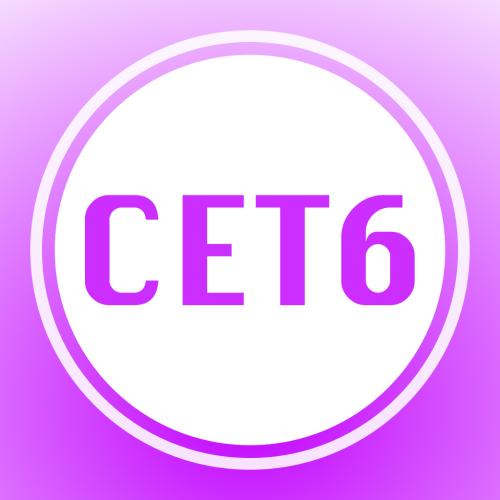








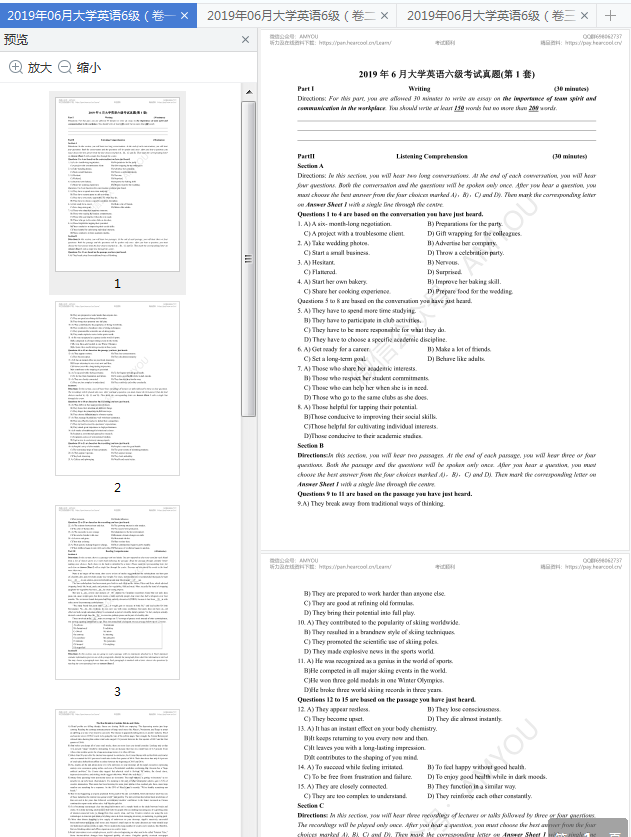
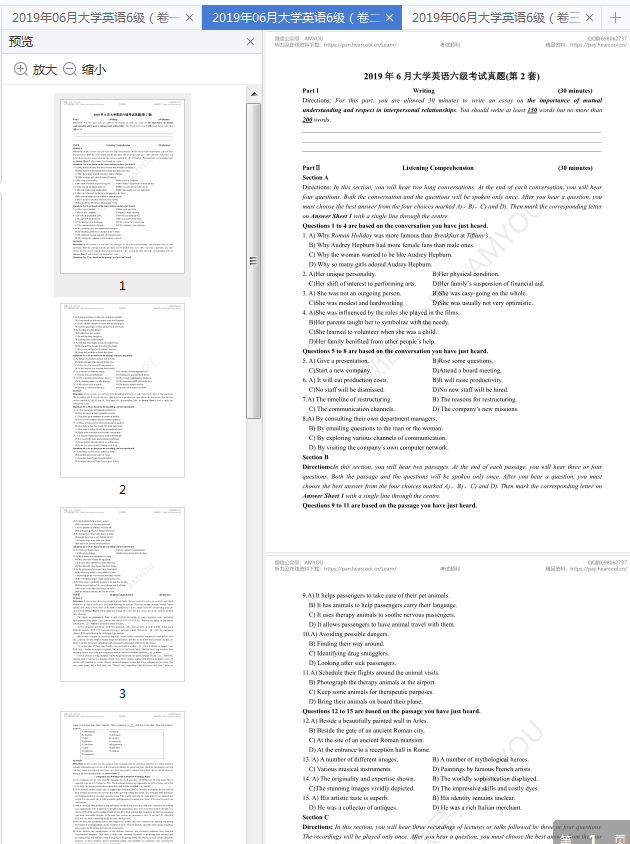
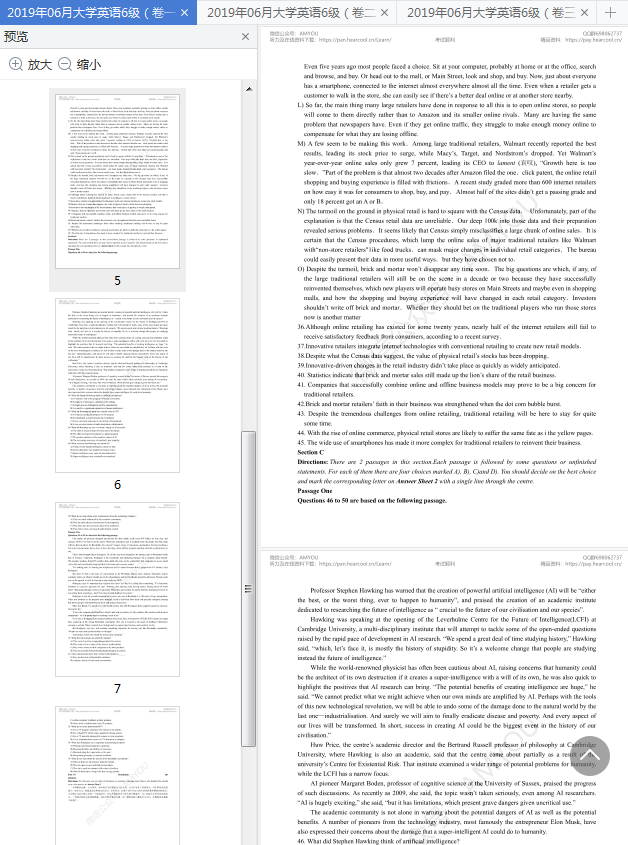
 黄冈历年中考试题及答案解析2012-2020年语文试卷word无水印版
黄冈历年中考试题及答案解析2012-2020年语文试卷word无水印版 2020全国中考物理真题及答案解析合集免费版
2020全国中考物理真题及答案解析合集免费版 数学物理方程讲义完整版1-5讲电子版pdf高清无水印版
数学物理方程讲义完整版1-5讲电子版pdf高清无水印版 2021各科中考总复习专题知识要点pdf整合版
2021各科中考总复习专题知识要点pdf整合版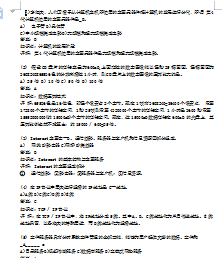 计算机三级网络题库及答案免费分享完整版
计算机三级网络题库及答案免费分享完整版 2021年新高考数学名校地市必刷题合集word版新高考专用版
2021年新高考数学名校地市必刷题合集word版新高考专用版 高考历史必背知识点归纳2021整理版完整版
高考历史必背知识点归纳2021整理版完整版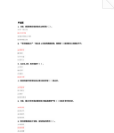 金融学网考试题及答案world版高清无水印
金融学网考试题及答案world版高清无水印 《学会宽容-善待他人》演讲稿300字world版docx5篇完整版
《学会宽容-善待他人》演讲稿300字world版docx5篇完整版 高考政治真题分项详解16套专题pdf完整版
高考政治真题分项详解16套专题pdf完整版 2021年高考英语一轮复习单元滚动双测卷人教版免费版
2021年高考英语一轮复习单元滚动双测卷人教版免费版 机械制造工艺设计杠杆(一)docx+pdf免费下载完整版
机械制造工艺设计杠杆(一)docx+pdf免费下载完整版 大小: 44.0M
大小: 44.0M










 中考复习资料大全
中考复习资料大全 新高考复习资料合集
新高考复习资料合集 三年级复习资料合集
三年级复习资料合集 二级建造师考试资料大全
二级建造师考试资料大全 数学题库文档
数学题库文档 Conefor Sensinode 2.6用户手册(中文版)
Conefor Sensinode 2.6用户手册(中文版)
热门评论
最新评论